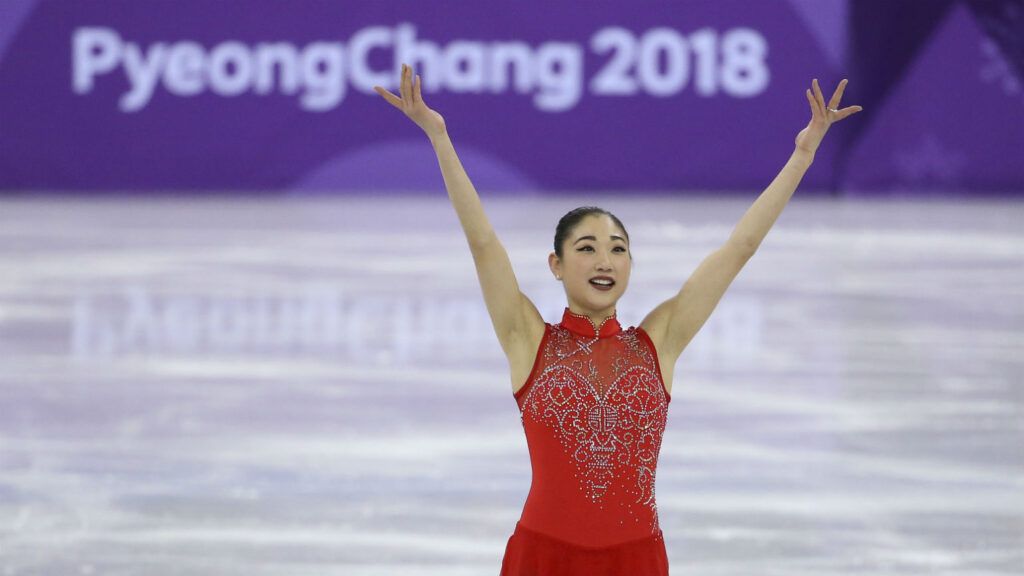Today Mirai Nagasu is a history-making Olympic figure skater for Team USA. But four years ago, she was eating In-N-Out burger with friend and fellow team member Adam Rippon on the roof of her house while the rest of their teammates were competing at the 2014 Olympic Games in Sochi.
That year, both figure skaters had narrowly missed making the team with the U.S. Olympic committee choosing to send a lower ranked skater in Nagasu’s place despite her fantastic performance winning bronze at the 2014 U.S. Championships.
The experience was heartbreaking for Nagasu, a California native and daughter of immigrants who took to the ice at age five.
“I considered quitting,” Nagasu tells Guideposts.org. “But at the end of the day I thought about how I would be retiring from figure skating without a true defining moment, and I didn’t want to retire based on a decision that wasn’t even mine. I felt like I could still do more and better.”
Better for Nagasu translated to a free-skate during the team competition that would go down in the books as a defining performance, not just for Nagasu and for Team USA, but for women’s figure skating. At the 2018 Games in Pyeongchang earlier this year, Nagasu became the first American woman to land a triple axel (a forward-facing jump that requires a skater to spin three times in the air before landing) in competition and just the third woman in history to achieve the feat. She won another bronze medal with Team USA at the Games.
“I was grateful for every moment of the Olympics,” Nagasu says. “I made it in 2010 and then I didn’t get to go in 2014, and that was how I learned that making the Olympics is not an opportunity that many people even have the chance to experience. To make another team eight years later, it really put things in perspective for me.”
Now Nagasu is competing again, swapping out Olympic ice for a crowded ballroom dancefloor, and going toe-to-toe with a handful of famous athletes, including friend Rippon, on Dancing with the Stars.
“I think that because I am a figure skater, I’m really enjoying dancing to music,” Nagasu says of the competition. “I’m having so much fun.”
It shows in her performance; the DWTS judges gave her and her partner Alan Bernsten stellar scores for their salsa routine last week and a the first perfect 10 score of the season on last night’s episode.
“Alan and I did a little prayer right before our music started and it was kind of a surreal experience,” Nagasu recalls of the pair’s first dance together.
To win the coveted Mirror Ball Trophy, she’s borrowing the same strategy she used for the Olympics on DWTS: hours and hours of old-fashioned hard work and practice.
“When we first learned the number I was like, ‘Oh my god, the music is so fast. I won’t be able to keep up with you.’ But when we performed, it almost felt slow because we had rehearsed it so many times.”
Doing the show with her best friend Rippon, who also scored 10s last night, has made the competition even more memorable.
“I love Adam so much,” Nagasu says, “[But] I think there’s a competitive nature to all of us. As a competitive figure skater, I look at the field and I’m like, ‘I want to be the best.’”
No matter the results of the competition, she knows she has a solid support system in her family.
Her parents, who immigrated from Japan 30 years ago, have worked hard to make sure Nagasu could pursue her Olympic dreams and now, with an Olympic bronze medal to their family name, they’re just enjoying the journey with her, sitting front row as she tries to add another title to the list.
“I owe everything to my parents,” Nagasu says. “My life, my goals, my dreams. To have put my Olympic medal around my parents’ necks, that meant everything because even though I had to put in the hours and work, and I was doing all of it, I wouldn’t have been able to do it without my parents’ support, financially and emotionally. On some tough days I had to learn to push myself and that perseverance didn’t just grow out of anywhere. It was something my parents taught me.”
Nagasu hopes her story can teach others something too. Despite missing an opportunity to compete in Sochi, she continued pursuing her dream. At the age of 24 she was one of the oldest competitors on the ice in South Korea, and when she decided to learn the triple axel, the most difficult jump in the sport for women, she did so knowing that most figure skaters stop learning new jumps in their early teenage years.
In other words, Nagasu shouldn’t have been able to land that triple axel in Pyeongchang. If she were any other skater, she might not have even made it to a second Olympics.
“It’s something that I’m really proud of,” Nagasu says of her comeback and the direction her life has taken after the Olympic Games. “I hope people relate to my story. When people tell you that you can’t, and you genuinely believe that you can, you just have to make it happen. Sometimes, you just have to get up and keep fighting.”





